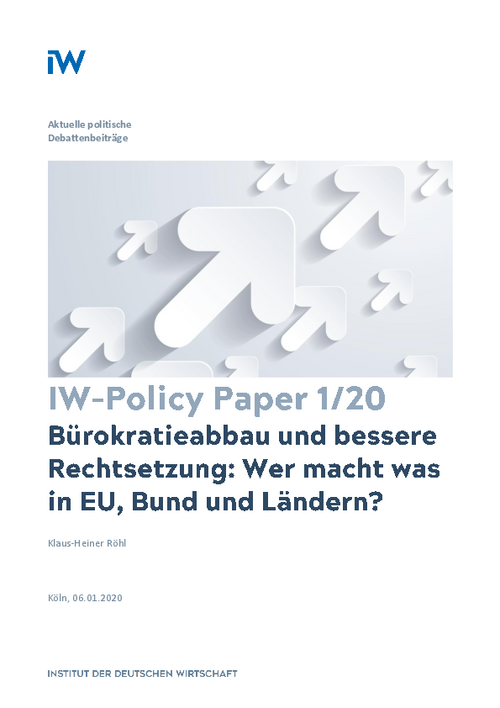This Policy Paper analyses the relevant institutions and administrative measures for curbing bureaucracy in the European Union, for the German federal administration and at German Laender level.

Reduction of Bureaucracy and Better Regulation: Competencies of the EU, the German Federal Government and the Laender
IW Policy Paper

This Policy Paper analyses the relevant institutions and administrative measures for curbing bureaucracy in the European Union, for the German federal administration and at German Laender level.
While bureaucratic burdens and measures to control and reduce bureaucracy are well documented for the national level in Germany, a common approach to the EU, national and state level is still missing. In the EU, the burdens for the enterprise sector resulting from European bureaucracy and regulation became an important topic only after 2000, as European competitiveness seemed to be in danger. Starting with the ‘European Charter for Small Enterprises’ in 2000, the ‘High Level Group of Independent Stakeholders on Administrative Burdens’ was established in 2007 and the ‘Small Business Act’ followed in 2008. In 2015, the REFIT-programme was introduced to strengthen the better regulation agenda. On the German national level, the introduction of the standard cost model and the establishment of the regulatory control council ‘Normenkontrollrat’ in 2006 can be viewed as milestones, because they were a prerequisite for a systematic measurement and reduction of bureaucracy-induced costs. In 2010, measurement was extended to total costs of regulation including compliance costs instead of costs of administrative procedures only. Nevertheless, a considerable discrepancy between bureaucracy felt by enterprises and measured by government agencies remains. At the administrative level of the 16 German Laender, institutions and measures to control and reduce bureaucracy vary widely. Only few Laender have introduced a measurement of state bureaucracy and a regulatory control council similar to the federal level. The paper concludes with recommendations to strengthen regulatory and bureaucracy control on the three governmental levels.

Klaus-Heiner Röhl: Bürokratieabbau und bessere Rechtsetzung – Wer macht was in EU, Bund und Ländern?
IW Policy Paper

More on the topic

Two years later: The EU Circular Economy Package
The European Commission aims to push forward the concepts of ‘recycle, repair and re-use’ as well as waste avoidance. Two years after adopting the Circular Economy Package, EU institutions finally agreed on new EU waste rules.
IW